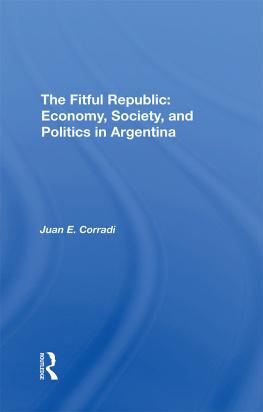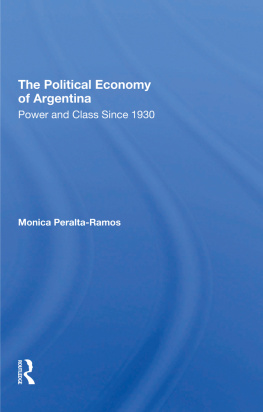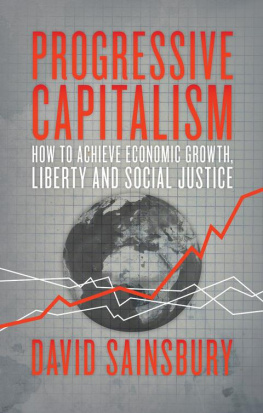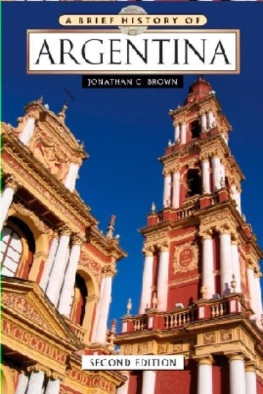The Fitful Republic: Economy, Society, and Politics in Argentina
The Fitful Republic: Economy, Society, and Politics in Argentina
Juan E. Corradi
First published 1985 by Westview Press, Inc.
Published 2019 by Routledge
52 Vanderbilt Avenue, New York, NY 10017
2 Park Square, Milton Park, Abingdon, Oxon OX14 4RN
Routledge is an imprint of the Taylor & Francis Group, an informa business
Copyright 1985 Taylor & Francis
All rights reserved. No part of this book may be reprinted or reproduced or utilised in any form or by any electronic, mechanical, or other means, now known or hereafter invented, including photocopying and recording, or in any information storage or retrieval system, without permission in writing from the publishers.
Notice:
Product or corporate names may be trademarks or registered trademarks, and are used only for identification and explanation without intent to infringe.
Library of Congress Cataloging in Publication Data
Corradi, Juan E., 1943
The fitful republic.
(Latin American perspectives series; no. 2)
Bibliography: p.
Includes index.
1. ArgentinaEconomic conditions. 2. Argentina
Social conditions. 3. ArgentinaPolitics and government.
I. Title. II. Series.
HC175.C668 1985 330.982'064 84-25794
ISBN 13: 978-0-367-29217-1 (hbk)
For Lela and Chelo
Contents
, Ronald H. Chilcote
In this book Juan E. Corradi presents a detailed, insightful, and interpretative analysis of political, economic, and social life in Argentina. He places his discussion in historical context by reviewing developments since the colonial period, but he concentrates on events from 1930 to the present, a period in which military intervention and control have been predominant. He is concerned primarily with questions of developoment and lack of development and directs attention to the impact of capitalism on dependent societies. He despairs that the problematic of dependency and the use of dependency as a critical perspective have progressively become cast as theory in an abstract and useless context. He prefers instead to locate his theory in concrete facts and actual events; interwoven through the historical discussion is a class analysis of life in Argentina, written in strong personal and interpretative terms. His book portrays the rise and fall of Peron after the Second World War; the attempt to escape the legacy of Peronism through a period of reform under Frondizi; the return to dictatorship; the reemergence of Peron; the disintegration of Argentine society in the wake of his death; and the recent "democratic" opening prompted by the military defeat of the Malvinas (Falklands) war with Great Britain and the subsequent electoral period.
Dr. Corradi, who teaches sociology at New York University, writes as expatriate, sympathizer, and skeptical intellectual. The present acccount is an updated and expanded version of his lengthy chapter in Latin America (Ronald H. Chilcote and Joel Edelstein, editors), a volume of essays published in 1974 and reprinted many times but now out of print. The book was used widely in university classrooms, and we have encouraged the authors to substantially revise and update their chapters for publication in the Latin American Perspectives Series published by Westview Press.
Corradi's original piece was in great demand and, given the dearth of serious studies on Argentina, it is particularly appropriate that it appear in its present form. Readers will find this account interesting, clearly presented, and useful, for Corradi has successfully combined historical narrative with profound analysis of the Argentine political economy.
Ronald H. Chilcote
for the Collective of Coordinating Editors,
Latin American Perspectives
Understanding the complexities of modern Argentina requires a theoretical effort and an attention to detail that surpass by far the country's importance in the concert of nations. The task is bound to tax the patience of non-Argentines who are curious and well disposed but unwilling to become specialists. I have designed this book with that problem in mindalso for readers who may not be experts but who nonetheless request, and deserve, some basic elements of judgment.
The following pages began as a chapter written for a massive volume on Latin America published in 1974. Subsequent work has changed my intellectual interests and some of my views. Argentina, which has not been my home for many years, is no longer my country, by choice; and yet I cannot be indifferent to it. It is at once too close and too far. I had to overcome a resistance to return to it in the pages of this book. But the gravity of developments in recent years and the attention they have drawn made me take a closer look. Much of this book is a product of those reflections.
The book endeavors to present the varied roles played by social groups in the modernization of Argentina. It seeks to account for the attainment of a high level of modernity in a country whose economy has manifested a notorious incapacity for self-sustaining growth. More specifically, it attempts to illuminate the political predicament of a modernized but marginal society: the persistent swing between tyranny and tumult.
There are several general considerations behind my undertaking, I have long been disappointed by the quality of theoretical reflection that has accompanied research on issues of development, I have been skeptical of the thesis that considers socioeconomic development as a road to carbon copies of Western democracy. The observation that political democracy is frequent among the rich nations of our time and a rare occurrence among the poor and weaker countries cannot be extrapolated and used to gauge a general trend. Yet not long ago, much within political sociology consisted of attempts to relate levels of wealth to types of political regime. The unique experience of some of the wealthiest lands was elevated to the status of a yardstick allowing researchers to formulate theoretical expectations about the less-developed countries. Processes of social change in the latter were reduced to the recapitulation of familiar sequences. If they did not conform to the expectations, the society that displayed them was treated as a deviant case. In this way the sociology of development was turned into a plethora of studies on "obstacles" and "exceptions" to a prefigured march of history. A correlational perspective in comparative sociology was extrapolated in the service of a progressive and optimistic interpretation of history. In essence, it was the old Whig interpretation in a new scientific guise.
I have never found convincing tales of history in which present enlightenment is contrasted with the benighted conditions of one's own past or with the backwardness of contemporaries, in which history is regarded as marching, with occasional setbacks, toward a better world, and in which moral and political issues appear unambiguous. Nor has a radical version of this kind of sentimentalism been more acceptable to me than the liberal variety that has always been more fashionable in academic circles. This book displays an alternative view. If it is true that, whatever else it may be, social science is also an essay in persuasion, then I argue to discourage historical progressivism, whether lineal or dialectical. Even Engels once spoke of "the enlightened prejudice that since the dark Middle Ages a steady progress to better things must surely have taken place." This prejudice prevents us from seeing that progress, if any, comes from tension, that it gives rise to as much suffering as happiness, and that it is no more sure, or convincing, than regress. The Whiggish interpretation of history that was smuggled into the studies of development implied that the causal processes active in less-developed countries were essentially the same as those once operative in the now advanced West. This assumption was highly questionable with regard to the experience of the less-developed countries and was actually also untenable in the light of the comparative history of modernization.







